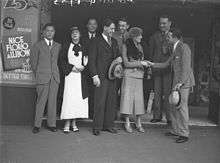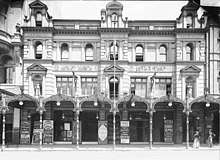New Tivoli Theatre, Sydney
The New Tivoli Theatre, Sydney, previously known as the Adelphi Theatre and the Grand Opera House, was a theatre and music hall at 329, Castlereagh Street, Sydney, Australia, which was long at the heart of the Tivoli circuit.[1]

It was generally called the Tivoli Theatre and operated between 1911 and 1966.[2]
History
Adelphi Theatre
The theatre was opened on 5 May 1911 as the Adelphi Theatre with George Marlow's production of The Bad Girl of the Family.[3] The auditorium was licensed to seat 2,400 patrons and was a pioneer of modern cantilever structural techniques. It was the first theatre to have its tiers and galleries constructed on the cantilever principle superseding iron columns to support the front of each tier.[3][4] The theatre was closed for renovations by Marlow's partner and entrepreneur Benjamin Fuller in October 1915.[3][2] The auditorium was redesigned by Henry Eli White to improve sight lines thus reducing capacity to 2100.[2]
Grand Opera House
.jpg)
In August 1916 the renovated theatre reopened and was renamed by Benjamin Fuller the "Grand Opera House".[3][2] From 1929 it became the major outlet in Sydney for variety theatre, featuring vaudeville acts.[1] Christmas pantomimes were popular and featured the in demand double act "Stiffy and Mo" (Nat Phillips and Roy Rene).[3]
New Tivoli Theatre
In 1932 two vaudeville performers Mike Connors and wife Queenie Paul took over the lease of the theatre with their company, Con Paul Theatres, and renamed it the New Tivoli Theatre.[3] The new name was in recognition of Harry Rickards's Tivoli Theatre at 79-83 Castlereigh Street (formerly the Garrick Theatre, Sydney).[3] This period saw the emergence of well known Australian entertainers including Roy Rene and George Wallace.[1] The theatre became famous for its chorus girls, known as "Tivoli tappers.[3]
Tivoli Circuit Australasia Pty Ltd emerged as the controlling organisation from late 1935 a period that saw an increase in imported acts.[3] A high point was the visiting Old Vic Company in 1948 when Laurence Olivier and Vivien Leigh performed there.[1] However restrictions in the war years led to a return of local artists and emerging stars featuring such names as Peggy Mortimer, Dick Bentley and Joy and George Nichols.[3]
.jpg)
The New Tivoli declined after the arrival of television in Australia in 1956, and the last show was staged in 1966 with the revue One Dam' Thing After Another, starring Gwen Plumb.[3] In 1969 the theatre was demolished. Its site is now occupied by Central Square, a tower of offices between Hay Street and Campbell Street.[1]

See also
- Garrick Theatre, Sydney the original Tivoli Theatre in Sydney
- Tivoli circuit
References
- Jill Dimond; Peter John Kirkpatrick (2000). Literary Sydney: A Walking Guide. University of Queensland Press. p. 9. ISBN 978-0-7022-3150-6.
- "Concise companion to theatre in Australia". State Library Catalogue. Sydney, NSW: Currency Press. 1997. p. 292. Retrieved 2 February 2017.
- McPherson, Ailsa (2010). "New Tivoli Theatre". Dictionary of Sydney.
- Irvin, Eric (1985). "Dictionary of the Australian theatre 1788-1914". State Library Catalogue. Sydney, NSW: Hale & Iremonger. pp. 293–294. Retrieved 2 February 2017.
External links
- Ailsa McPherson (2008). "Harry Rickards's Tivoli". Dictionary of Sydney. Dictionary of Sydney Trust. Retrieved 8 October 2015. [CC-By-SA]
- Valerie Lawson (2014). "Graeme Murphy's Tivoli". Dictionary of Sydney. Dictionary of Sydney Trust. Retrieved 5 October 2015. [CC-By-SA]
- Bentley, Paul (October 1999). "Australian Culture 1789-2000". The Wolanski Foundation Project. Retrieved 2 February 2017.